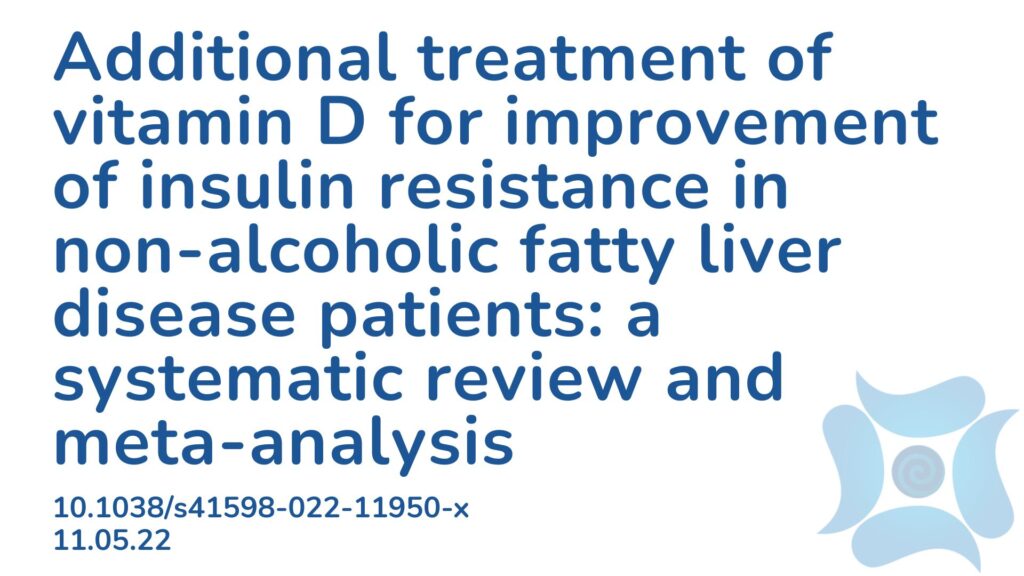Summary: This meta-analysis and systematic review aimed to evaluate the efficacy of vitamin D supplementation for the improvement of insulin resistance in patients with non-alcoholic fatty liver disease (NAFLD).
Vitamin D, a fat-soluble vitamin, has been shown in literature to regulate bone homeostasis, regulate insulin resistance, reduce chronic inflammation, support immune health and regulate fibrogenesis, which is why it may be indicated in the prevention and progression of NAFLD. However, there have also been randomised controlled trials (RCTs) conducted which evaluate vitamin D’s role in insulin resistance showing no benefit – hence the need for an evaluation of the most current and updated data.
Insulin resistance develops during NAFLD due to increased free fatty acids, inflammation in adipose tissue and a decrease of adiponectin, a hormone adipose tissue releases, helping with insulin sensitivity.
This meta-analysis and systematic review included seven RCTs, with publication years between 2012 and 2020. The experiment groups received vitamin D supplementation in varying doses while the control group received a placebo. The result of the current meta-analysis found vitamin D treatment, as oral supplementation or an intramuscular injection, may improve insulin resistance, marked by decrease of Homeostatic Model Assessment for Insulin Resistance (HOMA-IR) in patients with NAFLD. Vitamin D supplementation also showed to decrease ALT levels which is an enzyme found mostly in the liver. ALT is released into the bloodstream when liver cells are compromised, meaning higher ALT levels indicate cell damage in the liver. These results suggest vitamin D may be used as a potential adjunctive treatment for patients with NAFLD.
Abstract: Insulin resistance provides an important role in the pathogenesis of non-alcoholic fatty liver disease (NAFLD). Several studies already evaluate vitamin D supplementation for NAFLD patients in relation to insulin resistance. The results obtained still carry conflicting results. This study aimed to evaluate the effect of additional treatment of vitamin D for the improvement of insulin resistance in NAFLD patients. Relevant literatures were obtained from PubMed, Google Scholar, COCHRANE, and Science Direct database. The obtained studies were analyzed using fixed effect model or random effect model. Seven eligible studies with a total of 735 participants were included. Vitamin D supplementation improves insulin resistance in NAFLD patients, marked by reduced Homeostatic Model Assessment for Insulin Resistance (HOMA-IR), with pooled mean difference − 1.06 (p = 0.0006; 95% CI − 1.66 to − 0.45). Vitamin D supplementation increase the level of vitamin D serum with pooled mean difference of 17.45 (p = 0.0002; 95% CI 8.33 to 26.56). Vitamin D supplementation decrease ALT levels, with pooled mean difference of − 4.44 (p = 0.02; 95% CI − 8.24 to − 0.65). No effect was observed for AST levels. Vitamin D supplementation provides beneficial effects on the improvement of insulin resistance in NAFLD patients. This supplementation may reduce HOMA-IR in such patients. It may serve as a potential adjunctive treatment for NAFLD patients.
Article Publication Date: 11.05.22
DOI: 10.1038/s41598-022-11950-x




